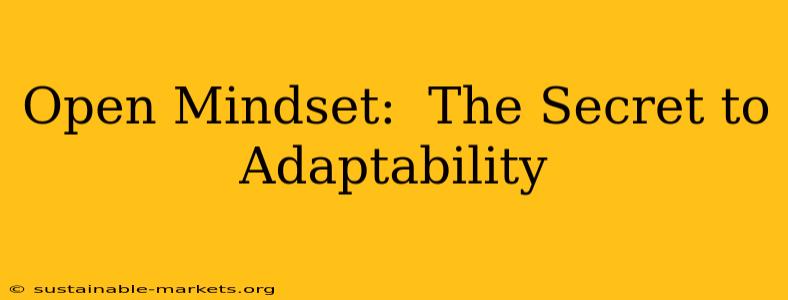In today's rapidly changing world, adaptability is no longer a desirable trait—it's a necessity. The ability to embrace change, learn from new experiences, and adjust your approach is crucial for success in any field. But what fuels this crucial adaptability? The answer lies in cultivating an open mindset. This isn't just about being open to new ideas; it's a fundamental shift in perspective that impacts every aspect of your life, from personal relationships to professional achievements. This post delves into the power of an open mindset and how you can cultivate one to unlock your full potential.
What is an Open Mindset?
An open mindset is characterized by a willingness to consider different perspectives, embrace challenges as opportunities for growth, and see failure not as an end but as a valuable learning experience. It's about recognizing that your beliefs and understanding are not fixed but rather constantly evolving. Individuals with an open mindset are curious, receptive to new information, and comfortable with ambiguity. They actively seek out diverse viewpoints and are less likely to be threatened by criticism or dissenting opinions.
How Does an Open Mindset Foster Adaptability?
An open mindset directly translates to increased adaptability because it creates a foundation for:
- Flexibility: People with open mindsets are more flexible in their thinking and actions. They can readily adjust their plans and strategies when faced with unexpected obstacles.
- Resilience: Setbacks and failures are inevitable. An open mindset allows individuals to view these experiences as opportunities for learning and growth, fostering resilience and the ability to bounce back from adversity.
- Innovation: Openness to new ideas and perspectives is the lifeblood of innovation. By embracing diverse viewpoints and challenging assumptions, individuals with open mindsets are better positioned to generate creative solutions and drive progress.
- Problem-Solving: An open mind encourages a broader approach to problem-solving. Instead of relying on familiar solutions, individuals are more likely to explore alternative approaches and perspectives, leading to more effective solutions.
- Empathy and Collaboration: Openness fosters empathy by encouraging individuals to understand and appreciate different viewpoints. This enhances collaboration and teamwork, leading to more effective outcomes.
How Can I Develop an Open Mindset?
Cultivating an open mindset is a journey, not a destination. It requires conscious effort and consistent practice. Here are some practical steps you can take:
1. Actively Seek Diverse Perspectives:
Make a conscious effort to engage with people from different backgrounds, cultures, and viewpoints. Read books and articles that challenge your existing beliefs. Listen actively and empathetically to others, even when you disagree.
2. Embrace Challenges as Opportunities:
View challenges not as threats but as opportunities for learning and growth. Embrace the discomfort of stepping outside your comfort zone and trying new things.
3. Reframe Failure as a Learning Experience:
Instead of dwelling on failures, analyze what went wrong and what you can learn from the experience. View mistakes as stepping stones towards improvement, not insurmountable obstacles.
4. Practice Active Listening:
Truly listen to what others are saying without interrupting or formulating your response. Try to understand their perspective, even if you don't agree with it.
5. Be Open to Constructive Criticism:
Don't take criticism personally. Instead, view it as valuable feedback that can help you improve. Ask for specific examples and use the criticism to identify areas for growth.
6. Cultivate Curiosity:
Ask questions, explore new topics, and embrace lifelong learning. Curiosity fuels an open mindset by fostering a desire to understand the world and its diverse perspectives.
Is an Open Mindset Always Beneficial?
While an open mindset is generally advantageous, it's important to acknowledge that there are times when a more cautious or decisive approach might be necessary. Maintaining a balance between openness and critical thinking is key. It’s about being open to new information while still maintaining a healthy skepticism and discerning what information is credible and valuable.
What are the potential downsides of having an open mind?
While generally positive, an excessively open mind can sometimes lead to vulnerabilities. It's crucial to be discerning and not blindly accept every idea presented. Maintaining a healthy level of skepticism and critical thinking alongside openness is vital. This prevents being easily manipulated or influenced by misinformation.
How can an open mind help with personal growth?
An open mind is a cornerstone of personal growth. By embracing new experiences, perspectives, and challenges, individuals can expand their horizons, overcome limitations, and achieve a deeper understanding of themselves and the world around them. This fosters self-awareness and enables more effective personal development.
By embracing the principles of an open mindset, you can unlock your potential for adaptability, resilience, and personal growth, navigating the complexities of the modern world with confidence and grace. Remember, it’s a continuous process of learning and refinement, and the rewards are immeasurable.

